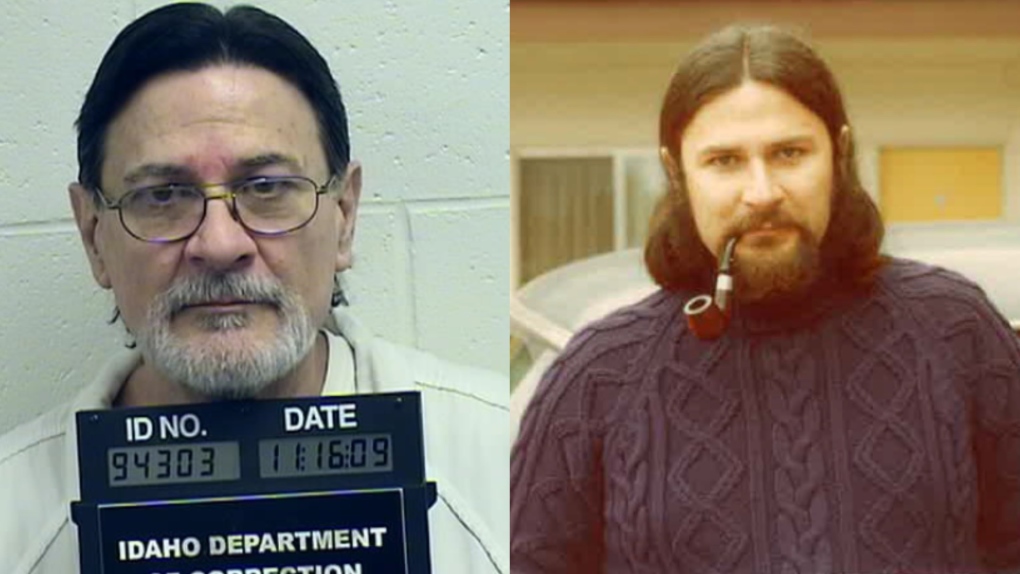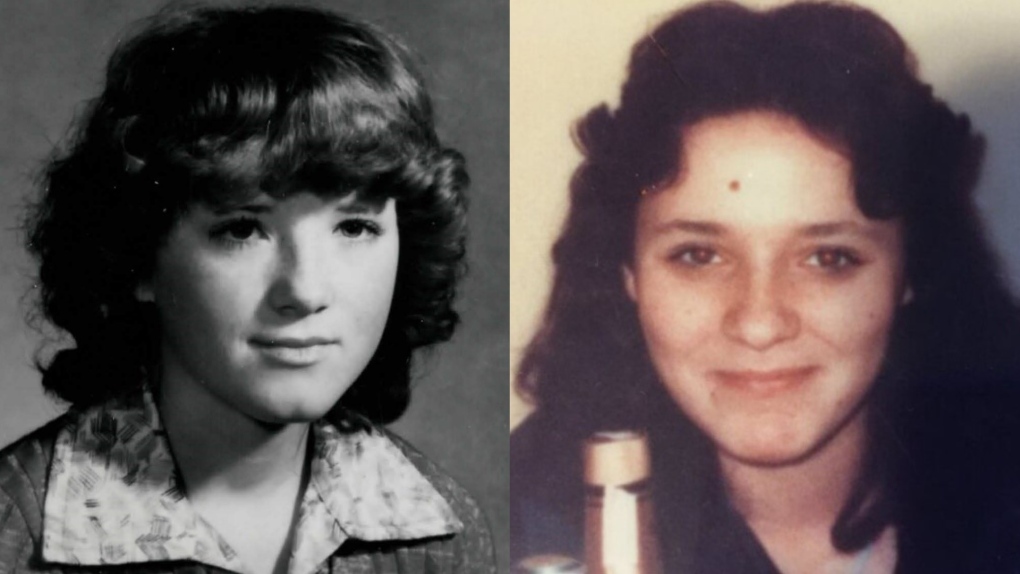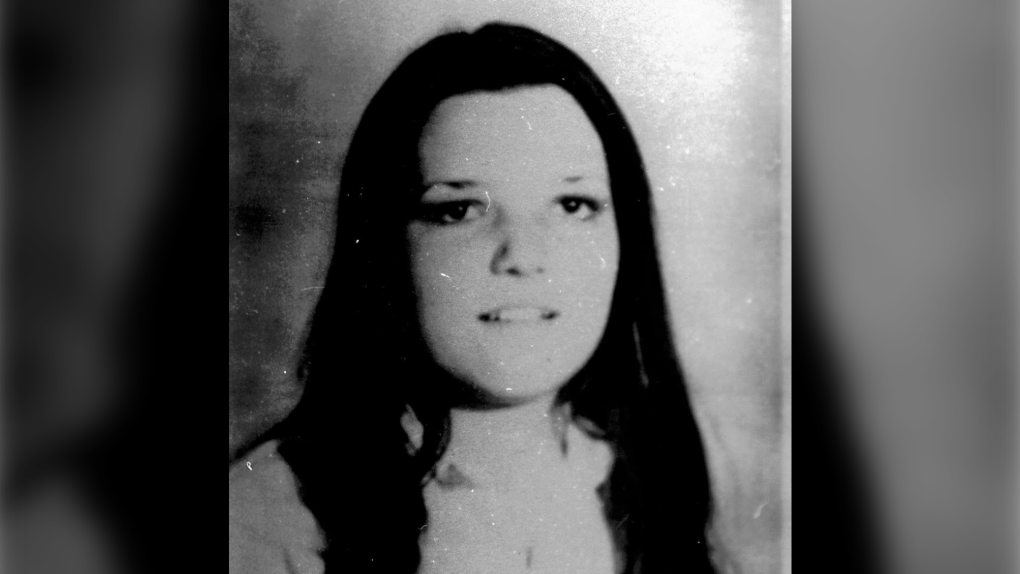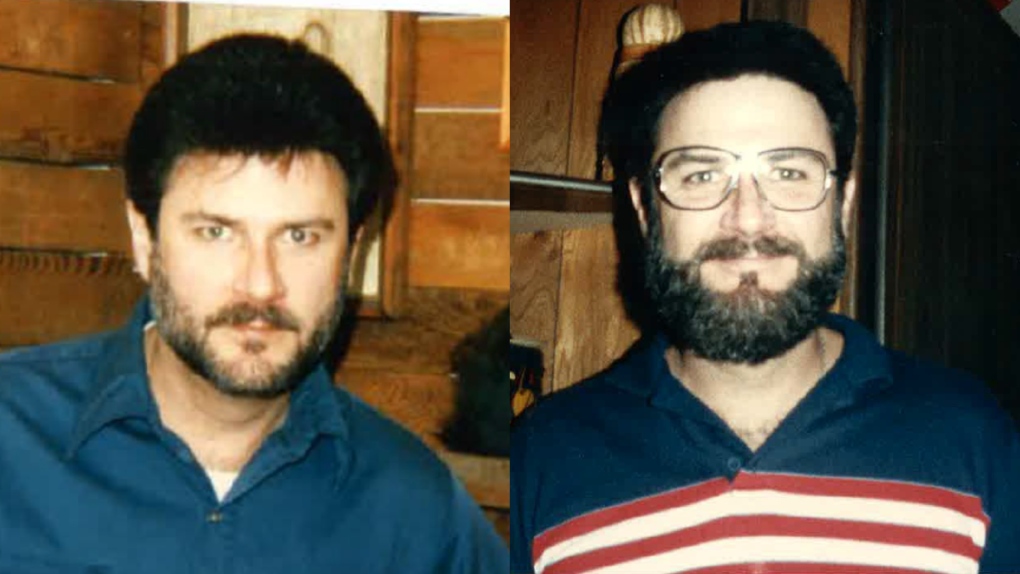Serial sexual offender linked to unsolved 1970s homicides of four Calgary girls, women
WARNING: This story contain details of sexual assault some may find disturbing.
An investigation into unsolved historical homicides from the 1970s has linked the deaths of two girls and two young women in and around Calgary to a now-deceased serial offender.
RCMP held a press conference on Friday to share the findings of the investigation, linking a serial sexual offender to the deaths of Patricia McQueen and Eva Dvorak, both 14 years old, Melissa Rehorek, 20, and Barbara MacLean, 19, between 1976 and 1977.
Based on forensic evidence, witness statements and similar fact evidence, Gary Allen Srery, a U.S. citizen born in 1942, is believed to be responsible for the four murders.
Srery died in prison in the United States in 2011.
Police said if Srery were alive today, he would be charged with two counts of non-capital murder on Patricia McQueen and Eva Dvorak, and one count of first-degree murder for each of Melissa Rehorek and Barbara MacLean's deaths.
RCMP noted the difference in charges reflects changes to the criminal code in the 1970s.
“For nearly 50 years, investigators did not give up in their pursuit to identify the man responsible for these murders,” Supt. Dave Hall, the officer in charge of the Alberta RCMP serious crimes branch, said Friday.
“Identifying the offender does not bring back Eva, Patsy, Melissa or Barbara, but it is my true hope that their families are finally able to have some answers as to what happened to their loved ones all those years ago.”
Police believe Srery may be responsible for more unsolved homicides and sexual assaults in western Canada.
 Gary Allen Srery is shown in supplied photos. (Supplied: RCMP)
Gary Allen Srery is shown in supplied photos. (Supplied: RCMP)
McQueen, Dvorak, Rehorek and MacLean
Patricia (Patsy) McQueen and Eva Dvorak, were friends attending junior high school in Calgary, according to RCMP.
The teenage girls were last seen walking together on the evening of Feb. 14, 1976, in downtown Calgary.
Their bodies were discovered the next morning laying on the road underneath the Happy Valley overpass on Highway 1 west of Calgary.
The McQueen family described Patricia as a teenager who was “full of life, adventure and curiosity.”
“It has been 48 years since our Sister Patsy (Patricia) was taken from us. As the years went on we thought we would never in our lifetime find out what happened on that dreadful day but never gave up hope that one day we would know the answers and finally have some comfort and closure,” the McQueen family said in a statement provided by RCMP.
“This evil monster has caused so much pain and suffering for countless families. He took a piece of every one of us when he took our loved ones.”
The Dvorak family said the case being solved provides some answers and closure.
“Eva was loved and cherished by her family and all who knew her. Her bright smile and bubbly personality were contagious and lit up any room. When Eva was around there was no sitting still, always dancing and singing any time of day,” the family said in a statement.
“She is truly loved and missed dearly.”
 Patricia McQueen and Eva Dvorak. (Supplied: RCMP)
Patricia McQueen and Eva Dvorak. (Supplied: RCMP)
Melissa Rehorek had moved to Calgary from Ontario in the spring of 1976.
She had been working as a housekeeper, living at the YWCA in downtown Calgary. She was last seen on the evening of Sept. 15, 1976, by a roommate. She had planned on hitchhiking out of the city on her day off.
Her body was found the next morning in the ditch on what is now known as Township Road 252, approximately 22 kilometres west of Calgary.
“Our message is one about Melissa being a fun-loving, adventurous and hard-working person. She was an honest positive person who trusted people,” the Rehorek family said in a statement.
“She enjoyed travelling to Banff for her love of nature but also to travel for her curiosity about seeing Canada.”
 Melissa Rehorek. (Supplied: RCMP)
Melissa Rehorek. (Supplied: RCMP)
Barbara MacLean, originally from Nova Scotia, had moved to Calgary six months before her death and was working at a local bank.
On Feb. 25, 1977, she visited the Highlander Hotel bar with friends. She was last seen walking away from the hotel alone, in the early morning hours of Feb. 26.
Approximately six hours later, her body was found in the area of Sixth Street and 80th Avenue N.E. At the time, the location was outside of the Calgary city limits.
“The pain of losing Barbara so tragically has been a constant presence in our lives, but recent developments have finally brought us answers to questions that we've had to live with all these years,” the MacLean family said in a statement.
“We are four families who share a connection of the worst kind-one of pain, grief, and suffering over many years. It is our hope that we all may find a measure of peace in the days ahead.”
 Barbara MacLean. (Supplied: RCMP)
Barbara MacLean. (Supplied: RCMP)
Although autopsies were conducted on all four victims, initially, the causes of death for McQueen and Dvorak were not determined. Their deaths were not ruled as homicides at the time and were investigated as suspicious deaths.
Both Rehorek and MacLean’s causes of death were attributed to strangulation. Their deaths were investigated as homicides.
All four files were never closed.
RCMP said seminal fluid was discovered at all three crime scenes, but due to the technological constraints of the time, a DNA profile could not be created.
Similarities between Rehorek and MacLean’s deaths led investigators at the time to believe the same person was responsible for both homicides.
“For nearly 50 years, the Alberta RCMP exhausted all investigational means, in an attempt to identify the person responsible for these tragic deaths,” Hall said.
“The files were continually reassessed, with investigators following all leads that they could.”
The initial investigations continued into the 1980s and task forces were created in the 1990s to re-examine evidence, tips and leads not previously followed.
Genetic breakthrough
Police used genetic testing to narrow down their search and identify Srery over the past three years.
In 2021, the RCMP and Calgary Police Service partnered to use investigative genetic genealogy to identify a suspect.
“Our goal is to seek the truth and find out what’s happened to these people, and so jurisdiction is not going to stand in our way,” Insp. Kevin Forsen, with the Calgary police major crimes section, said.
“We had two detectives and two genealogists. Within 11 weeks they had identified Srery and cleared the other 300 suspects RCMP had compiled.”
After re-examining evidence seized more than 45 years ago, a DNA profile was created to be shared with other law enforcement agencies.
After work to build a family tree and further targeted DNA testing, a suspect hypothesis was provided to police.
“For the first time, investigators finally had the name of a viable suspect, one that had never surfaced in the investigation before, however, the hypothesis still needed to be confirmed,” Hall said.
Police determined that Srery had a connection to Canada and a history of committing violent acts against women.
The DNA profile was also matched to crime scene evidence that was resubmitted from the McQueen and Dvorak investigation. It was confirmed to match the DNA from the Rehorek and MacLean cases.
This led police to believe that the same man was responsible for all four deaths and that McQueen and Dvorak had been murdered.
Police identified Srery during a cross-border investigation and learned he had died in an Idaho state prison while serving a life sentence for sexual assault.
His DNA was then confirmed as a match to the unknown DNA profile present on all four victims.
 Gary Allen Srery. (Supplied: RCMP)
Gary Allen Srery. (Supplied: RCMP)
Srery was a United States citizen who was living illegally in Canada at the time of the murders, according to RCMP.
He had an extensive criminal history in the U.S. before coming to Canada, which included forcible rape, kidnapping, burglary and sexual perversion.
Police believe he fled the U.S. in 1974 after posting bail for a rape charge in California.
He had a transient lifestyle and lived under aliases in Calgary in 1976-77, including Willy Blackman and Rex Long. He occasionally worked under the table as a line cook.
Srery was known to frequently change his appearance, place of residence and vehicles.
RCMP said he lived in Alberta and British Columbia from the late 1970s until 2003 when he was deported.
Calgary police have used the DNA profile to review outstanding unsolved homicide files but at this point, do not believe there are any other open cases in their jurisdiction linked to Srery.
RCMP is asking for help filling in the blanks on the rest of Srery’s time in Canada.
“Srery’s criminality span decades over multiple jurisdictions and numerous aliases. Alberta RCMP believes there will be more victims,” Insp. Breanna Brown, provincial operations support officer for the Alberta RCMP serious crimes branch.
Anyone who recognizes Srery, or knew him by one of his aliases, is asked to contact the Alberta RCMP historical crime unit via K-IDEOLOGY@rcmp-grc.gc.ca or by phone at 780-509-3306.
“If you believe Srery may be associated to or responsible for a crime in your jurisdiction, we ask that you reach out to the policing agency within that jurisdiction to report,” RCMP said in a news release.
With files from CTV News Calgary's Timm Bruch.
CTVNews.ca Top Stories

LIVE @ 11:15 A.M. MT Extent of Jasper wildfire damage still unknown; Alberta Wildfire hosting update
Officials are waiting to learn Thursday morning the extent of wildfire damage in the Jasper townsite of Jasper National Park, which flames began to eat away at the night before.
Jasper wildfire burns buildings, while poor air quality forces some fire crews out
Prime Minister Justin Trudeau announced on social media that Ottawa has approved Alberta's request for federal assistance after a fast-moving wildfire hit Jasper National Park and its townsite late Wednesday.
Jennifer Aniston criticizes JD Vance for 'childless cat ladies' remarks: 'I pray that your daughter is fortunate enough to bear children'
Jennifer Aniston is criticizing JD Vance for comments he made in his past about women without children.
Canadian women's soccer team staffer given suspended prison sentence over drone incident, prosecutor says
A Canada women's soccer team staffer has been given an eight-month suspended prison sentence after flying a drone to film the closed-door training session of the New Zealand team on Monday, the prosecutor's office said in a statement.
'Sick to my stomach': People grieve Jasper National Park by sharing favourite photos
As an out-of-control wildfire roared through Alberta’s famed Jasper National Park and its townsite late Wednesday, many are fearing the worst as officials warned of 'significant loss' within the area.
Prince William made $42 million from his newly inherited estate last year, reports show
Newly released financial reports show that William, the Prince of Wales, drew a salary of $42.1 million last fiscal year, his first since inheriting the vast and lucrative Duchy of Cornwall.
Sale of envoy's NYC condo 'expected to exceed' $9M: government
The current official residence for Canada's representative in New York City is 'being readied for sale,' according to a spokesperson from Global Affairs Canada.
'I'm so broke': Two Toronto women speak out after losing $76,000 in romance scam
Two women from the Toronto area are speaking out after losing thousands of dollars to a romance scam, including a single mother who lost $62,000.
Barrie-Innisfil MPP 'blacked-out' and crashed car into window of child care centre
Staff at a Barrie child care centre say they are frustrated by what they call a local MPP's inadequate response after a car crashed through a window in one of the toddler rooms.






























